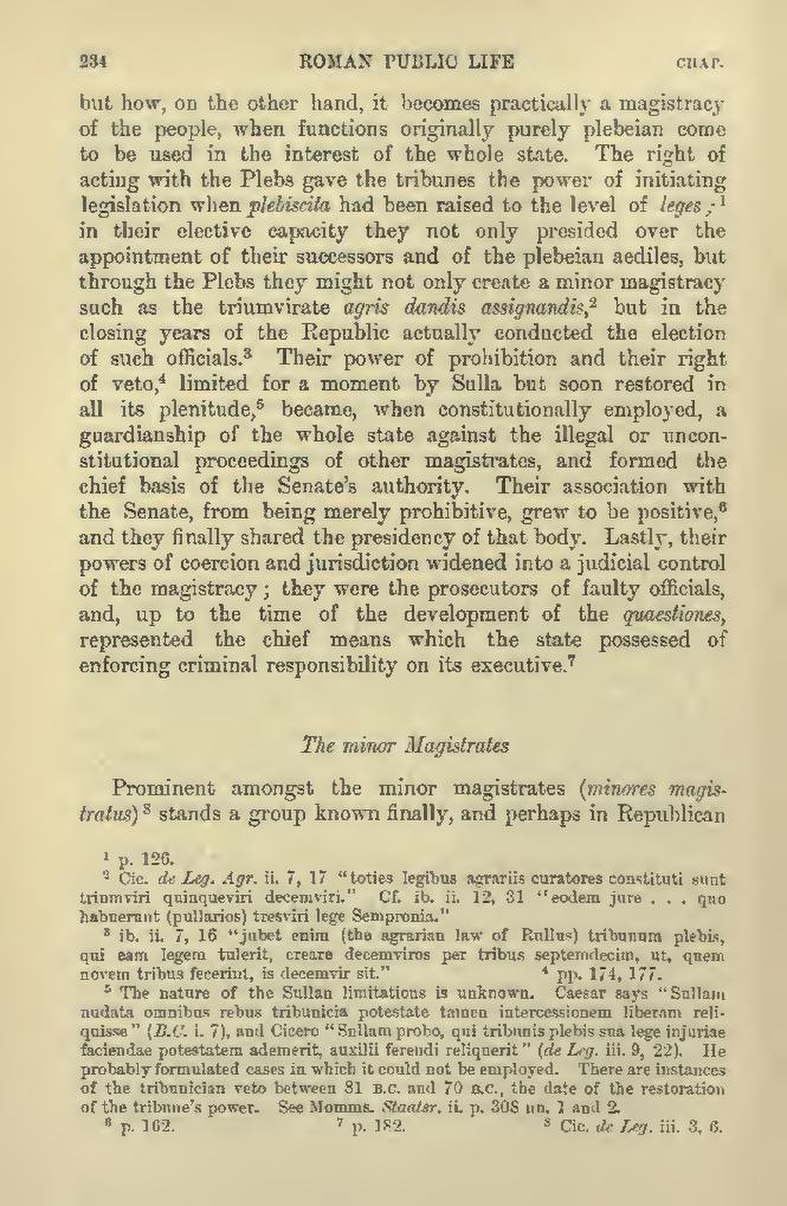but how, on the other hand, it becomes practically a magistracy of the people, when functions originally purely plebeian come to be used in the interest of the whole state. The right of acting with the Plebs gave the tribunes the power of initiating legislation when plebiscita had been raised to the level of leges;[1] in their elective capacity they not only presided over the appointment of their successors and of the plebeian aediles, but through the Plebs they might not only create a minor magistracy such as the triumvirate agris dandis assignandis,[2] but in the closing years of the Republic actually conducted the election of such officials.[3] Their power of prohibition and their right of veto,[4] limited for a moment by Sulla but soon restored in all its plenitude,[5] became, when constitutionally employed, a guardianship of the whole state against the illegal or unconstitutional proceedings of other magistrates, and formed the chief basis of the Senate's authority. Their association with the Senate, from being merely prohibitive, grew to be positive,[6] and they finally shared the presidency of that body. Lastly, their powers of coercion and jurisdiction widened into a judicial control of the magistracy; they were the prosecutors of faulty officials, and, up to the time of the development of the quaestiones, represented the chief means which the state possessed of enforcing criminal responsibility on its executive.[7] The minor Magistrates
Prominent amongst the minor magistrates (minores magistratus)[8] stands a group known finally, and perhaps in Republican
- ↑ p. 126.
- ↑ Cic. de Leg. Agr. ii. 7, 17 "toties legibus agrariis curatores constituti sunt triumviri quinqueviri decemviri." Cf. ib. ii. 12, 31 "eodem jure . . . quo habuerunt (pullarios) tresviri lege Sempronia."
- ↑ ib. ii. 7, 16 "jubet enim (the agrarian law of Rullus) tribunum plebis, qui eam legem tulerit, creare decemviros per tribus septemdecim, ut, quem novem tribus fecerint, is decemvir sit.'
- ↑ pp. 174, 177.
- ↑ The nature of the Sullan limitations is unknown. Caesar says "Sullam nudata omnibus rebus tribunicia potestate tamen intercessionem liberam reliquisse" (B.C. i. 7), and Cicero "Sullam probo, qui tribunis plebis sua lege injuriae faciendae potestatem ademerit, auxilii ferendi reliquerit" (de Leg. iii. 9, 22). He probably formulated cases in which it could not be employed. There are instances of the tribunician veto between 81 B.C. and 70 B.C., the date of the restoration of the tribune's power. See Momms. Staatsr. ii p. 308 nn. 1 and 2.
- ↑ p. 162.
- ↑ p. 182.
- ↑ Cic. de Leg. iii. 3, 6.
